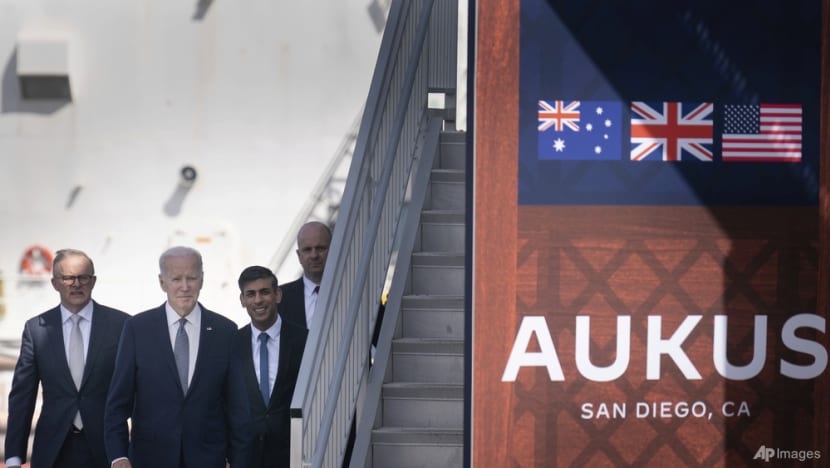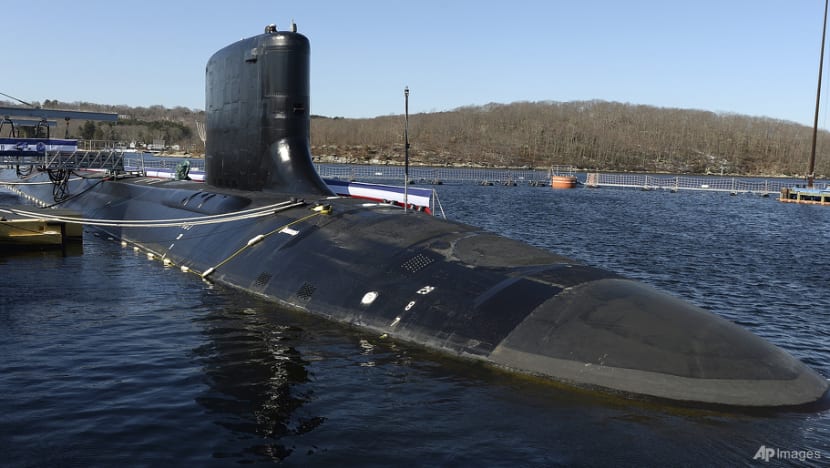Commentary: The squawkus about AUKUS is getting louder
The strategic case for the Australia-UK-US pact is sound. But technical and political doubts are growing, says the Financial Times’ Gideon Rachman.

British Prime Minister Rishi Sunak during a meeting with US President Joe Biden and Australian Prime Minister Anthony Albanese at Point Loma naval base in San Diego, California, Mar 13, 2023, as part of AUKUS. (Stefan Rousseau/Pool Photo via AP)

This audio is generated by an AI tool.
LONDON: AUKUS continues to make waves across the Pacific. Unveiled in 2021, the tripartite pact centres around Australia’s acquisition of nuclear-powered submarines from the United States and the United Kingdom.
For the Biden administration, AUKUS has rapidly become a centrepiece of its efforts to contain Chinese power. For Australia, it is a far-reaching choice to tighten its military ties with the US. For the UK, it is a symbol of the country’s renewed global ambitions.
China has repeatedly attacked AUKUS as dangerous and confrontational. Shortly after it was launched, Boris Johnson, Britain’s prime minister at the time, gleefully lampooned the “raucous squawkus from the anti-AUKUS caucus”.
Three years on, that squawkus is not dying down. Last week, China’s Global Times ran an article that simultaneously speculated that Japan might join the pact, while proclaiming hopefully that “AUKUS is crumbling”.
That is a serious overstatement. But it is true that there are growing suspicions that the initial sales pitch covered over some serious problems with the detail.

The debate is fiercest in Australia, since AUKUS is intended to be the heart of its strategic posture for decades to come. The government and both major political parties still stand squarely behind the pact.
But two influential former prime ministers - Paul Keating and Malcolm Turnbull - have made scathing criticisms.
CONCERNS ABOUT AMERICAN PRIMACY AND RELIABILITY
Concerns about the viability of AUKUS fall into three main baskets: Strategic, political and technical.
On a strategic level, critics charge that Australia has made an unsustainable bet on continued American primacy in the Pacific. Hugh White, an influential academic, argues that: “The massive shift in power and wealth since 1980 makes it impossible to perpetuate the old US-led order.” White also worries that Australia is now tacitly committed to fighting alongside the US in a future war with China.
On a political level, there is growing anxiety about whether the US is still a reliable ally. If Donald Trump wins a second term, the assumption that America can sustain stable support for its global strategic commitments looks much more questionable. And yet the commitment will have to be sustained, since AUKUS is a multi-decade project.
On a technical level, acquiring and maintaining nuclear-powered submarines involves a big and very costly technological leap for Australia. AUKUS will be done in three complicated stages.
First, Australia will overhaul its current conventional submarines. Then, in the early 2030s, it will take delivery of some second-hand Virginia-class nuclear subs from the US. A decade later, the first AUKUS-class subs - designed in Britain, featuring US technology and built in the UK and Australia - will be deployed.
There is some quiet dismay in the Australian defence establishment at the large British role in the building of SSN-AUKUS. There is much less confidence in the UK’s military-industrial base than in US capabilities.
Those doubts will have grown following the difficulties of British aircraft carriers and the failure of a recent test of a UK Trident nuclear missile. Elizabeth Buchanan of West Point Military Academy argues bluntly that: “SSN-AUKUS probably won’t materialise.” Australian critics of AUKUS fear the country is setting off down a long and costly road to nowhere.
STRENGTHENING DETERRENCE
The strategic arguments against AUKUS are the weakest ones. The Australian government, like the Japanese and the Indians, is justifiably concerned by China’s military and territorial ambitions. It understands that if Beijing successfully invaded Taiwan - or managed to enforce its claims over the South China Sea - China would become the dominant power in the Indo-Pacific, with profound consequences for Australian security.
AUKUS is a classic effort to strengthen deterrence by increasing the risks to China of any potential aggression. As one Australian security official puts it: “The goal is to prevent a war, not to fight one.”
Fears about relying on America would clearly increase if a volatile Trump returned to power. But Michael Green, a former White House official now at the University of Sydney, argues that he would be likely to appoint anti-China hawks to key positions and they will maintain the commitment to AUKUS. “I’m very confident that Australia will get the Virginia-class subs,” he asserts.
Even some AUKUS defenders agree that there are real doubts about the final piece of the puzzle - the construction of the new nuclear submarines.
It is not just the capacity of the British to build them that is in question. It is also the evolution of military technology. It is entirely possible that manned nuclear submarines will have lost their utility in 30 years’ time and will be replaced by unmanned vehicles.
AUKUS NOT JUST ABOUT SUBMARINES
But the merit of a decades-long alliance is that it can adapt. AUKUS is not just about submarines.
Pillar two of the pact is about sharing advanced military technology in areas such as hypersonics, cyber and artificial intelligence. As military technology evolves, AUKUS can evolve along with it.
The pact is ultimately a statement of resolve and long-term commitment. It is based on a shared perception of the growing strategic threat from China and Russia as they work together to overturn the current international order. That perception seems more pressing and valid than ever.















